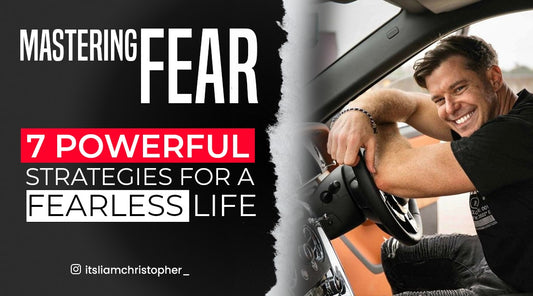Fear is a powerful and often overwhelming emotion that can hold us back from living our lives to the fullest. But, fear is not something that should control us; rather, it's a natural response to certain situations.
The Science Behind Fear
Before we can learn how to overcome fear, it's crucial to understand its roots. Fear is an evolutionary response designed to keep us safe from potential threats. When we encounter a situation that our brain perceives as dangerous, it triggers a complex cascade of reactions, releasing hormones like adrenaline that prepare our bodies to respond to the threat – the fight-or-flight response.The Role of Fear in Our Lives
Fear isn't always a negative force. In fact, it can be a valuable tool for self-preservation. Imagine crossing a busy street without fear; you might not be as cautious, putting yourself in danger. However, problems arise when fear becomes irrational, chronic, or paralyzing, preventing us from leading fulfilling lives.
Recognizing the Different Faces of Fear
Fear comes in various forms, each with its unique challenges. Let's take a closer look at some common types of fear:Generalized Anxiety
Generalized Anxiety Disorder (GAD) is characterized by excessive, uncontrollable worry about various aspects of life. People with GAD often find it challenging to relax and may experience physical symptoms like restlessness, muscle tension, and fatigue.Specific Phobias
Specific phobias involve an intense and irrational fear of a particular object or situation, such as heights, spiders, or flying. These fears can significantly impact daily life.Social Anxiety
Social anxiety disorder involves an extreme fear of social situations, leading to avoidance behavior. It can hinder personal and professional growth.Post-Traumatic Stress Disorder (PTSD)
PTSD can result from experiencing or witnessing a traumatic event. It often leads to flashbacks, nightmares, and severe anxiety.
Overcoming Fear: Practical Strategies
Now that we've explored the nature of fear let's dive into practical strategies to stop living in fear and start living life on your terms:Face Your Fears Head-On
- The first step to overcoming fear is acknowledging it. Identify what you're afraid of and confront it gradually.
- Start with small steps and gradually work your way up to more significant challenges.
- Seek support from friends, family, or a therapist if needed.
Mindfulness and Meditation
- Mindfulness practices can help you stay grounded in the present moment, reducing anxiety about the future.
- Meditation can calm your mind, lower stress levels, and improve your ability to handle fear-provoking situations.
Visualize Success
- Use the power of visualization to picture yourself successfully navigating through situations that trigger fear.
- Visualization helps reprogram your mind to associate positive outcomes with challenging scenarios.
Positive Affirmations
- Replace negative self-talk with positive affirmations. Repeating phrases like "I am capable" or "I am in control" can boost your self-confidence.
Physical Activity
- Regular exercise releases endorphins, the body's natural mood lifters, reducing overall anxiety.
- Physical activity can also provide a healthy outlet for stress and pent-up energy.
Seek Professional Help
- Don't hesitate to consult a therapist or counselor if your fears are significantly impacting your life.
- Therapy can provide you with coping mechanisms and strategies tailored to your specific needs.
Practice Self-Compassion
- Be kind and patient with yourself. Remember that everyone experiences fear at some point in their lives.
- Avoid self-criticism and focus on self-encouragement.
Wrap-up
Fear is a natural and sometimes necessary emotion, but it should never control your life. By understanding the science behind fear and implementing practical strategies, you can stop living in fear and start living a life filled with courage, resilience, and personal growth.
Remember, you are not alone in this journey, and there is help available when you need it. Embrace the challenge, confront your fears, and reclaim the life you deserve.





